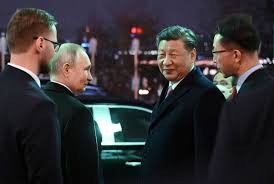Sept. 3—Chinese President Xi Jinping and Russian President Vladimir Putin me Sept. 2, the third day of President Putin’s exceptional four-day visit to China. They first met in the Great Hall of the People with their larger delegations, which involved most of President Putin’s cabinet, which accompanied him on this trip. Twenty different agreements were signed, including an important, legally binding memorandum on the construction of the Power of Siberia-2 pipeline. There have been negotiations on this matter for several years, but some concerns on the Chinese side with regard to costs now seem to have been overcome.
The two leaders underlined the importance of the relationship, pledging to strengthen high-level exchanges, mutual support, and coordination for greater development of bilateral relations in the future. Xi greeted Putin as a “lao pengyou,” an old friend. Xi said: “Chinese-Russian relations have stood the test of the international situation, and serve as a model of interstate relations of eternal good-neighborliness, friendship, comprehensive strategic interaction, mutually beneficial cooperation and mutual benefit.”
Putin praised Xi for hosting this year’s Shanghai Cooperation Organization (SCO) Summit, the biggest in history. “Russia is willing to maintain strategic coordination with China, strengthen high-level contacts and expand practical cooperation in various fields to promote the further development of high-level bilateral relations,” said Putin. He also called Xi’s Global Governance Initiative “timely and necessary,” and believes it “will play an important part in addressing the global governance deficit.” Putin said that under the leadership of the two heads of state, Russia-China relations have reached an historic high.
After the meeting in the larger format, the two Presidents, with a smaller retinue, retired to the government residence at Zhongnanhai. Putin was accompanied by Foreign Minister Sergey Lavrov, Defense Minister Andrei Belousov, Presidential assistant Yury Ushakov, and Deputy Chief of Staff of the Presidential Administration Maxim Oreshkin. With President Xi Jinping were Foreign Minister Wang Yi and director of the CCP Central Office Cai Qi, and effectively Xi’s Chief of Staff. Here they continued discussion on international and regional issues of mutual interest. The bilateral cooperation agreements cover the areas of energy, space, artificial intelligence, agriculture inspection and quarantine, health, scientific research, education , and media sectors. These included various projects such as the establishment of Russian-Chinese pilot and demonstration zones for agricultural cooperation in the Russian Far East; strategic cooperation in the peaceful use of nuclear energy; and the integration of the Russian scientific instrument, the Lunar Dust Monitor, into China’s Chang’e-7 spacecraft mission. They also included establishing a Russian-Chinese Institute for Fundamental Research and the joint financing of scientific research projects.




